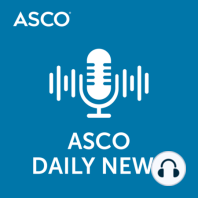14 min listen
ASCO22: Addressing Challenges in Cancer Care With Dr. Neeraj Agarwal
FromASCO Daily News
ratings:
Length:
20 minutes
Released:
May 26, 2022
Format:
Podcast episode
Description
Dr. Neeraj Agarwal, of the University of Utah Huntsman Cancer Institute, tells host Dr. John Sweetenham, of the UT Southwestern Harold C. Simmons Comprehensive Cancer Center, about the first study to examine the quality of diagnosis and treatment of breast cancer in sex and gender minority patients and other key studies on disparities associated with access to clinical trials and rising drug costs. Transcript Dr. John Sweetenham: Hello, I'm John Sweetenham, the associate director for Clinical Affairs at UT Southwestern Harold C. Simmons Comprehensive Cancer Center and host of the ASCO Daily News podcast. I'm delighted to welcome my friend and colleague Dr. Neeraj Agarwal, the director of the Genitourinary Cancers Program and a professor of medicine at the University of Utah's Huntsman Cancer Institute. Dr. Agarwal also serves as editor-in-chief of the ASCO Daily News. Today, he'll be sharing his insights on compelling studies that will be featured at the 2022 ASCO Annual Meeting, addressing access to clinical trials, disparities associated with high deductible health plans, rising drug costs, and more. Our full disclosures are available in the show notes and disclosures of all guests on the podcast can be found on our transcripts at asco.org/podcasts. Neeraj, it's great to have you back on the podcast. Dr. Neeraj Agarwal: Thanks, John. Dr. John Sweetenham: Neeraj, let's begin with Abstract 6503. This study looks at the impacts of high deductible health plans on delays in metastatic cancer diagnosis. What do you think about this study and why should it be on our radar? Dr. Neeraj Agarwal: Well, John, in high deductible health plans, patients are liable for the cost of all cancer-related care, with the exception of screening tests, until their annual deductible is met. Due to increased out-of-pocket costs, patients may postpone seeing a physician for concerning symptoms or diagnostic testing, leading to delayed diagnosis. So, in this study, Mr. Nicholas Trad and J. Frank Wharam assessed the impact of high deductible health plans on the timing of metastatic cancer detection. The authors leveraged a nationally representative cohort of more than 340,000 privately insured members whose employers mandated a switch from a low deductible of less than $500 plan to a high deductible plan of more than $1,000. So, the group consisted of more than 1 million individuals in a contemporary time frame, whose employers offered only low deductible plans. Participants were matched based on multiple baseline characteristics, time to metastatic cancer diagnosis, and the before and after switching to high deductible health plans was investigated using a weighted Cox proportional-hazards model. After matching, there were no systematic differences between the 2 groups with regards to baseline characteristics, and there were no differences in time to metastatic cancer diagnosis prior to the switch to high deductible health plans. However, after the employer-mandated switch to the high deductible health plans, these participants had lower odds of metastatic cancer diagnosis, which was significant, statistically speaking, and indicates delayed detection of metastatic cancer diagnosis relative to the control group. Dr. John Sweetenham: This is certainly concerning data, Neeraj. What's your key takeaway from this study? Dr. Neeraj Agarwal: So, the key takeaway from the study is that compared with conventional health plans, high deductible health plans are associated with delayed detection of metastatic cancer, implying that patients postpone seeking care for concerning symptoms or even defer diagnostic testing when they're exposed to high-cost sharing. Dr. John Sweetenham: Thanks, Neeraj. So, let's continue with this theme of the financial burden of cancer care for our patients. Of course, we're all aware of the rising costs of targeted oral therapies, and this was addressed in Abstract 6504, where the study l
Released:
May 26, 2022
Format:
Podcast episode
Titles in the series (100)
Addressing Gender Disparities In The Global Oncology Workforce and Sexual Harassment: On today’s episode, Dr. Pamela Kunz, director of the Center for Gastrointestinal Cancers at the Yale School of Medicine, and vice chief of Diversity, Equity and Inclusion for Medical Oncology at Yale, discusses compelling sessions from the 2021 ASCO... by ASCO Daily News
